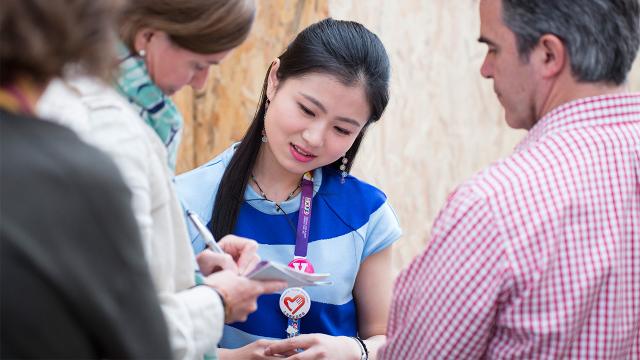Y |
u Yinglei has had so much fun at the Milan Expo she doesn't want to leave.I'm counting the days I have left here, says the 21-year-old, whose time as a volunteer at the China Pavilion will end this month. I will miss everything; the experience, the work, and my friends.
She says the experience has helped her to mature and to consider things from a more holistic perspective compared with her days at university.
It's changed me a lot, she says. Being a volunteer has been a tiring job, but I've felt happy every day.
Yu is one of 40 volunteers who work at the China Pavilion during the expo. Their main tasks are directing visitors to various displays, explaining the exhibitions, and helping with administrative work.
Twelve come from China, each staying for two months at a time, and the rest are from Italy. They will work for three months, and are mostly students of Chinese or people with a great interest in Chinese culture.
The team works six days a week, either from 10:30 am to 3:30 pm, or from 3:30 pm until 9 pm.
I had some expectations before I came to the expo, but being here has really surprised me. Everything at the China Pavilion has greatly impressed me, says volunteer Valentina Antonaci, 25. If you go around the expo, you can see the China Pavilion with the garden and flowers is absolutely amazing.
The master's student, who majors in cultural studies and economics at Milan University, comes from about 25 kilometers northeast in Masate.
She says becoming a volunteer was like a dream come true. It has helped her to vastly improve her spoken Mandarin, as well as to make many friends and deepen her understanding of China.
Five years ago, when I heard the expo would happen, I started studying Chinese. Over time my language got better, and here I am as a volunteer, she says, adding that she one day hopes to be a teacher at a Confucius Institute in Italy.
The Chinese volunteers say they had been impressed by their Italian colleagues' passion and hard-working attitude. Yu says the close interaction had changed her perception of Italian people.
I realized they take great responsibility for the tasks assigned to them, she says. On the first day, for example, we were very busy and the weather was very cold, but the Italians worked so hard and never complained.
She says her Italian colleagues had also made her feel at home, especially when she fell ill. I went back to our accommodations one day to rest, and they contacted me to ask if I was OK, she recalled. When they saw me the next day, they wanted to make sure I was feeling better and told me I could rest more if I still didn't feel well. I was touched.
Ruan Weishan, a fourth-year Italian major at Beijing's Communication University of China, had previously spent a year on a exchange program in Perugia, so was already familiar with the country's culture before signing up as a volunteer. Yet she says the expo experience has further broadened her understanding of Italy.
When I studied in Perugia, many of my classmates were international students, so I felt the exposure to Italian culture was limited. At the expo I need to help Italian visitors every day, so I can practice my language and learn more about their ways of thinking, she says.
I love the language, it's so musical, and I love Italian food. The culture is diverse, and I'm discovering so much about culture in different parts of the country.
The expo had also showed her how international the world today is, she adds. Here we have visitors from all over the globe. I can see Muslim women in hijabs and other women in miniskirts. It's really a melting pot of culture, and I feel happy our world is such an inclusive place.
Introducing Chinese culture and history to expo visitors has also helped Ruan to better appreciate and understand her own culture.
I'd been taking the Chinese language, food and culture for granted, but since I've been asked questions by visitors, I've really thought about these crucial elements of our culture, she says, citing the common fascination with dishes such as Beijing duck and tofu.
Chinese culture is still unknown to many people in the world, but they are very curious to learn, and I'm very glad that I can be a part of this process to make it more accessible and less mysterious.
Along with learning Chinese culture, volunteers at the China Pavilion are also learning valuable life skills, such as how to control crowds of people as well as responding to a medical emergency.
We have learned to calmly find solutions, and at the same time to take the initiative to think about how to better do things, Yu says.
On many occasions our suggestions have been accepted by our supervisors, such as reorientating the registration table to allow more space for visitors to line up at the entrance.
I feel my tasks, however small, contribute toward a bigger cause, and it's very fulfilling, she adds.
Volunteers from all over the world live at the expo village in Milan, and Yu says she has made friends with people from other countries, especially from Kazakhstan because their rooms are so close.
We play table tennis a lot. I'm surprised by how good they are, she says. They are such friendly people. We've enjoyed our time together.




